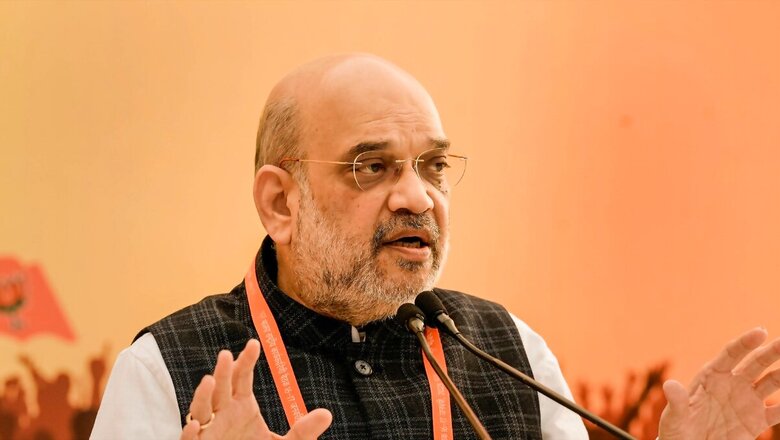
views
India will soon have an integrated centralised database of cooperative societies in the country. This pioneering record, the first-of-its-kind globally, will not only map all cooperative societies and their ecosystems within the nation, but also serve as a powerful tool to bridge geographical gaps, besides identifying untapped areas and sectors ripe for cooperative expansion.
A repository like this was much-needed, as despite being home to over 8.5 lakh cooperative societies of the total 30 lakh globally (i.e., over 25% of the total), India had no way to track their activities, financial details and membership numbers.
According to an estimate, 91% of villages in the country have some form of cooperatives actively operating within their boundaries, with around 28 crore Indians connected to them in one way or another.
The absence of hands-on information was one of the biggest handicaps when the Modi Government created a separate ‘Ministry of Cooperation’ in July 2021 to realise the vision of ‘Sahkar se Samriddhi’ (Prosperity through Cooperatives).
The mandate of this new ministry, which was carved out of the erstwhile Ministry of Agriculture, Cooperation and Farmers’ Welfare, is to strengthen the cooperative movement in the country, deepen its reach at the grassroots level and create an appropriate policy, legal and institutional framework to help cooperatives realise their full potential.
“There is no cooperative database in the country, and unless there is a database, one can’t think of (cooperative) expansion," Union Minister of Cooperation Amit Shah had acknowledged, while attending the National Conference of Agriculture and Rural Development Banks (ARDBs) in July last year.
“We do not have any database of how many coastal states do not have fishermen’s cooperative societies. We do not have any database of how many cooperatives are working in the country. There is also no database of how many villages are deprived of the benefits of Primary Agricultural Credit Societies (PACS). Expansion can happen only when one knows where expansion is to be done," Shah had said, adding that the government has initiated the process of creating this data warehouse.
Given the complexity of the layered cooperative sector involving multiple states and sectors, the creation of the said database was easier said than done. The end aim is to “provide a single-point access to authentic and updated information on 8.5 lakh cooperatives of different sector across the country".
INITIATED BY THE COOPERATIVE MINISTRY
The process of developing a National Cooperative Database (NCD) was initiated by the Cooperative Ministry in consultation with the State/UT governments, National Cooperative Federations, Central Ministries, and all other stakeholders at various levels.
“There was no comprehensive, authentic and updated data repository in the country regarding cooperatives, their activities, members, financial details, etc. In most districts, records are maintained manually, making it difficult to utilise the information for planning purposes," explained Dr Ranjna Nagpal, Ex DDG National Informatics Centre and Chief Project officer, heading the National Cooperative Database (NCD) project.
The participating entities provided inputs that contributed to the development of data fields for each sector. The subsets were then fed with humongous and diverse sets of information.
“To develop the cooperative or any other sector, the first essential step is to understand the current state of the sector. For the first time, we will have access to actual figures related to cooperative societies in the country," said Yogendra Kumar, Marketing Director of The Indian Farmers Fertiliser Cooperative Limited (IFFCO), the largest cooperative globally.
Information technology tools such as Geographic Information System (GIS) were used to manage, analyse and map location data. The Management Information System tailors this data to meet the requirements of both end users and administrators, providing real-time information. The database will assist various central ministries, state governments, cooperative sectors and sectoral institutions such as National Bank for Agriculture and Rural Development (NABARD), National Dairy Development Board (NDDB), National Fisheries Development Board (NFDB), among others.
“By adopting the latest IT tools and Management Information System (MIS), NCD would be available on a real-time basis to all stakeholders. It would also help in identifying gaps/vacuums in the geographical distribution of cooperatives in the country and establishing upward/downward linkages of cooperative societies (from primary to apex)," Dr Nagpal, who is responsible for solution design, development of online software solutions, and supporting their implementation across India, elaborated.
THE PHASES
Union Minister of Cooperation Amit Shah took a keen interest in the entire process from the beginning.
Given the enormity and complexity of data collection, it was decided to proceed in a phased manner, with each phase dedicated to a specific number of tasks.
Phase 1 involved mapping 2.64 lakh cooperative societies across three major sectors: PACS (100,429), Dairy (138,179), and Fisheries (24,796). This phase was completed in February of this year.
PACS, with approximately 13 crore farmer members, form the vital foundation of the three-tier short-term cooperative credit system, which is crucial for rural economic development.
Phase 2, focused on mapping National Cooperative Societies/Federations, has also been successfully completed.
Phase 3, on the other hand, is intended to map the remaining cooperative societies, numbering 5.8 lakh, operating in all other sectors.
HOW WILL THE NCD PORTAL WORK? HOW WILL IT BENEFIT END USERS SUCH AS COOP SOCIETIES, GOVTS & INSTITUTIONS?
“It’s a user-friendly portal where all district and state registrars of cooperatives are provided secure access to upload and update information about each cooperative society registered with them. Data related to approximately 8 lakh cooperatives operating in nearly 30 different sectors has been entered, and a dashboard has been created for generating reports, including analytical layers," explained Dr Nagpal, who is also actively involved in guiding and assisting all stakeholders in understanding and using the portal.
She further added, “The database will serve as the primary planning tool for Central Ministries, State Governments, Cooperative Federations, Cooperators, and Sectoral Institutions such as NABARD, NDDB, NFDB, national cooperatives, and more. It will facilitate policy-making, enhance governance, and improve transparency."
Elaborating on the potential of the database, Yogendra Kumar from Indian Farmers Fertiliser Cooperative (IFFCO) added, “This significant initiative will not only aid in planning for the agriculture and related cooperative sectors, but also provide a foundation upon which new schemes can be planned and launched. Moreover, it will enable the effective addressing of various shortcomings that have been affecting the sector."
The comprehensive database will be groundbreaking, providing a single point of access to information on approximately 800,000 Cooperative Societies. It will serve as a comprehensive, accurate and up-to-date data repository, enabling the identification of gaps in the geographical distribution of Cooperative Societies and offering insights into vertical and horizontal linkages among cooperatives. This resource will greatly facilitate planning, policy development and implementation for all stakeholders.
Kumar, who also serves as the chairman of the newly established National Level Multi-State Seed Cooperative Society and has extensive years of experience in the cooperative field, praised the efforts of Union Cooperation Minister Amit Shah. He noted that, in addition to the database, the Cooperative Ministry has embarked on a campaign to digitise cooperative societies across the country.
In a written reply to a question in the Lok Sabha last month, Shah informed that the process to onboard 63,000 PACS onto an ERP-based national software, with an outlay of Rs. 2,516 crore, has commenced.


















Comments
0 comment